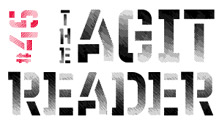
Burn Tape
Exit Stencil
To say that Blake Miller appeared to be on the cusp of the weirdo folk movement three years ago is an understatement. Together with Cats was a triumph for an unassuming singer-songwriter who basically tiptoed into a largesse that spread from Devendra Banhart to Sufjan Stevens. It wasn’t so much the originality of his songs as it was the oblong execution, the maze of woozy vocals in the background, the isolation exposing a glowing heart. And just like that Miller disappeared (from Columbus at least) just as quietly. With Burn Tape, he’s resurfaced and is oddly only releasing the album digitally and on cassette (vinyl please?). Who’s to say if such a move is an effort to stay in the shadows, keep the music elusive, erase what’s done before the world has a chance to judge? It is, after all, the fragility of Miller’s voice and songs that hold the most intrigue. If he were to get to confident, the music might lose that edge. Burn Tape still retains the mystery to an extent. It’s a perfect collection of acoustic lullabies for late spring/early summer sloth. “In the Danger” is a slightly melancholic, whistled melody that yearns for sunbeams and peace of mind. With Miller these meditations mostly deal in dreamscapes, and the extra-sensory cushion he lends to each track—those extra voices, light handclaps, thrifty beats (as on “Pigeons Like Windowsills”)—that resultantly feel like drifting dreams he’s tried to capture in a song. It’s either dreams or feel-good nostalgia when on the breeziest track, “Long Hair,” over simple strum, Miller remembers the influence of his father in the backyard.
Though there’s nothing redundant or staid with these languid ballads, on the second half of Burn Tape Miller goes off the deep end, and he’s much better for such experimentation. “The Ghost of My Soul” starts stripped to the bone, but develops into what could be mistaken for a blistering metal jam. So too on “A Golden Bird, A Wooden Floor, and A Box of Skulls,” where Beck-esque beat box competes for center-stage. Both are frighteningly original, but it’s the ending “VGHFF. (Air Flex)” that wrestles for Burn Tape’s strangest revelation. What could’ve just been a cap of collaged noise turns into a great cool-down of organ and distortion (along with some haunting field recordings). While it might not fit the mood of the rest of the record, it’s a rewarding finale to a pretty spotless collection of songs.
Kevin J. Elliott
MP3: “Long Hair”

Petits Fours
Cooking Vinyl
Given the many guises that Black Francis (a.k.a. Frank Black, a.k.a. Charles Thompson) has adapted as leader of the Pixies and the Catholics and as a solo artisit, it would seem like there’s little territory left for him to plant his flag. But with Grand Duchy, his new project with wife Violet Clark, he’s found some unfurrowed ground for which to plow. While his most recent work outside the Pixies may have come off as purposefully anachronistic, on Petits Fours he exhibits a sweet tooth for pop and an almost fanciful approach that appears contrary to the didactic habits he’s shown in the past.
Perhaps it’s the influence of the missus, but Mr. Black seems less concerned with archetypes—deconstructed or otherwise—and more about finding a hook on which to hang his hat. “Break the Angels” may recall the Pixies—its sparse bassline reminiscent of “Gigantic”—but “Lovesick” has more in common with the radio-friendly sounds of the Dandy Warhols and “Black Suit” could be the Sisters of Mercy in another life. Sure, Frank has written pop songs before, but never before have they at once been so ornate or uncomplicated. Petits Fours has all the markings of a casual affair (not a “proper” album in critic speak), but that doesn’t make it any less enjoyable.
Stephen Slaybaugh

Teufelswerk
International DeeJay Gigolo
Mention techno to most Americans and you’ll get one of three reactions: a screwed-up face, an accapella rendition of a bass drum thump or mentions of oversized raver wear. It seems impossible to conceive that it is more than the soundtrack for drug use and douchebaggery. Thankfully the sharply tailored, dry witted producer known as DJ Hell is here to change your mind with his concept album Teufelswerk.
The double disc Teufelswerk—which is German for “Devil’s Work”—is divided over two concepts “Night” and “Day.” The “Night” side focuses on club-ready sounds, while “Day” is a mostly ambient affair. While Hell and his label, the drolly-named International DeeJay Gigolo Records, were associated with the short-lived electroclash movement, his sound truly goes broader and deeper than that. Hell manages to effortlessly incorporate everything from pumping Chicago house to the stainless steel techno of his homebase Berlin.
What makes Hell one step beyond some other DJs-turned-artists and what makes Teufelswerk accessible to those who’d normally distain techno and dance music in general is how he constructs his tracks. The songs aren’t merely a series of loops that mindlessly bang on for a seemingly endless period of time. Instead, the tunes are so meticulously crafted that you’ll never realize that many of them push the nine-minute mark.
Teufelswerk also avoids making the double-disc approach an exercise in ego with a pretty savvy programming move. “Night” shows a very different approach than “Day.” For the relentlessly sophisticated “Night,” Hell managed to recruit two of the most unlikely collaborators to help him out: Bryan Ferry of Roxy Music and the man known as P. Diddy. Ferry delivers a smooth-as-ice vocal turn on the opening track, “U Can Dance,” while secret dance music enthusiast Diddy contributes a hilariously profanity ridden rant on “The DJ.” The “Day” disc is a bit more laidback, taking a lush, cinematic approach. But just when you think you’ve got things pegged, Hell and “Day” co-producer Peter Kruder shake things up with the slow cooking “I Prefer Women To Men.” It starts in an ambient vein and them morphs into a down-tempo electro rave-up. And then for good measure, the set wraps things up with a cover of Hawkwind’s “Silver Machine.” If Teufelswerk is indeed the Devil’s work, it’s time to give the Devil his due.
Dorian S. Ham

Devotion Implosion
Cordless
If the Jesus and Mary Chain had a dime for every johnny-come-lately... Well, nevermind; there’s worse places from which the kids could be nicking these days.
I’m always a little suspicious of bands from Los Angeles, a place where haircuts and musical stylings are changed daily to keep up with the trends. But Gliss has made an album exhibiting such virtuosic noise that the fact that they may be on to the next thing before I finish writing this review is of little matter. Actually, that’s being a little facetious, as I seem to recall hearing their debut, Love the Virgins, which was filled with a similarly righteous hazy shade of grey. The band seems to understand volume and feedback can be used to one’s advantage, and the songs on Devotion Implosion are steeped in plenty of both. Leadoff cut “Morning Light” may seem like a Psychocandy aperitif (actually the band probably owes just as much to the Raveonettes, with whom they’ve toured), but guitarist David Reiss is bold enough to deviate from the fuzzy groove as well. “Anybody Inside” also finds gold amongst nettles of six-string cacophony. The band’s only misstep is too think that keyboards have any place amongst this divine morass. “29 Acts of Love” suffers because of it, sounding by proxy like some huckster’s idea of shoegaze. If they had ditched such distractions, this record might have been perfect, but as it is, it’s still worth every, er, dime.
Stephen Slaybaugh
ALBUM REVIEWS
Pterodactyl, Worldwild
Eat Skull, Wild and Inside
Mr. Lif, I Heard It Today
Super Furry Animals, Dark Days/Light Years
Ashley Beedle & King Britt, Southport Weekender: Volume 8
A-Trak, Infinity +1
Circus Devils, Gringo
Pet Shop Boys,
Yes
Suckers, Suckers EP
Metric, Fantasies
Micachu & the Shapes, Jewellery
Mastodon, Crack the Skye
The Thermals, Now We Can See
Yeah Yeah Yeahs, It's Blitz!
